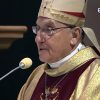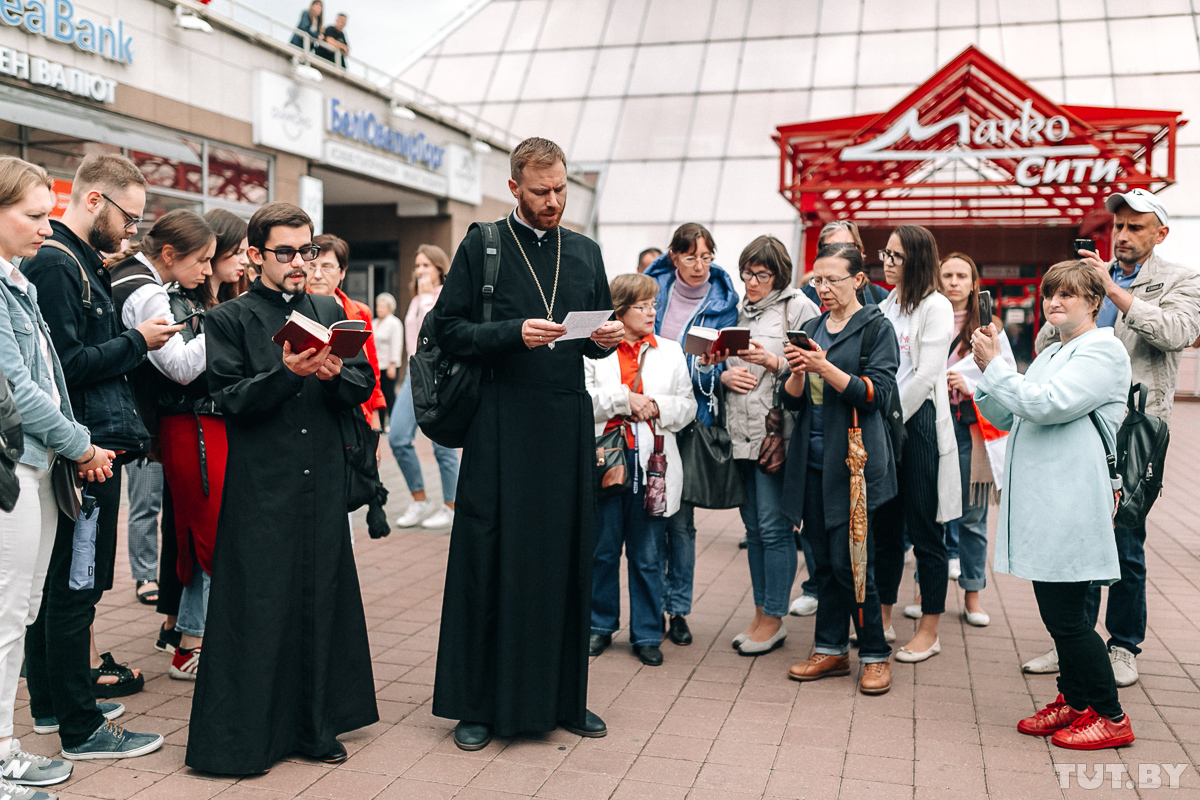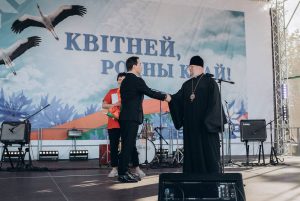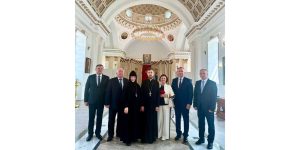Belarusian Orthodox Church and political agenda in Belarus
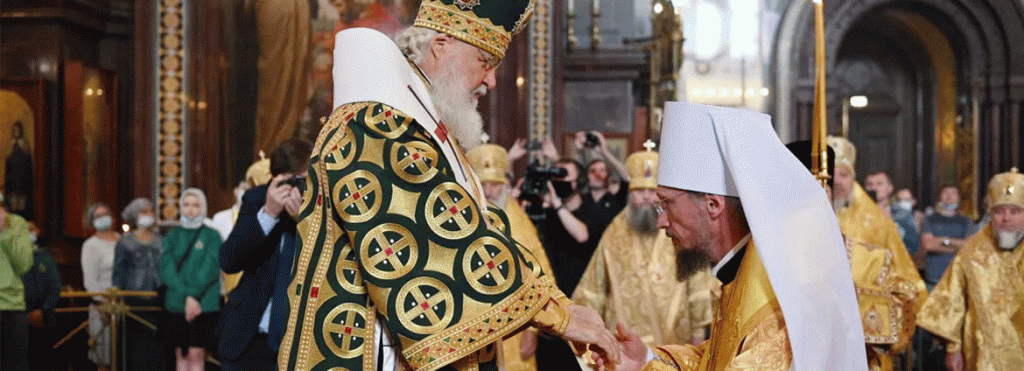
Belarusian Orthodox Church before the choice: Lukashenko or the flock
The dramatic events of the presidential campaign in Belarus gave rise to an unprecedented wave of protest against the regime of Alexander Lukashenko, who has been leading the country since 1994. In contrast to previous pre-election periods, in 2020 the presence of religion in the political sphere was not visible. But in the post-election period, the religious community, including the Orthodox, became so actively involved in the protest movement and in criticism of the regime’s actions that it shocked Lukashenko and led to unprecedented repression by the regime, including a hasty change of the head of the Belarusian Orthodox Church (BOC), Metropolitan Pavel, the refusal of entry to the Metropolitan of the Roman Catholic Church (RCC) in Belarus, Tadeusz Kondrusiewicz, into Belarus, and later threats of criminal prosecution of the Orthodox priest Vladimir Drobyshevsky and the Catholic priest Viachaslau Barok, as well as the head of the Synodal Information Department of the BOC, Archpriest Sergiy Lepin and Auxiliary Bishop of the Minsk-Mogilev Diocese of the RCC Yury Kasabutsky.
During the 2001 elections, many neo-Protestant movements were active in protests and there was also a noticeable, albeit completely unsuccessful, attempt to nominate a candidate with a clear confessional position – the former director of the Atlant plant, Orthodox philanthropist Leonid Kalugin. (In this case Kalugin’s confessional position was so intense that even the official biography of the failed candidate began with the words “by the grace of God he was born into an Orthodox family.”) The next elections, in 2006, became the political context for the formation of a Christian Democratic Party (Belarusian Christian Democracy), which actively introduced a Christian agenda into politics while simultaneously instrumentalizing the protest potential of neo-Protestant churches. In 2010, the BCD was already able to nominate its candidate for the presidency with a clear religious direction, V. Rymasheusky, while actively introducing religious themes, rhetoric, and subculture into the political sphere, making it possible to mobilize believers in the campaign, including the Orthodox. Rymashevsky’s campaign and its mobilization potential, in contrast to Kalugin’s political attempt, was quite successful.
But even then, the regime, resting on the loyalty of the Belarusian Orthodox Church and striving for a monopoly on support from religious organizations while assessing the potential of the BCD to mobilize such support in its own favor, tried to prevent this political movement from realizing this potential. First, it has prevented the registration of the party for more than ten years. Second, it has been attempting to discredit the party according to the church’s position. Even in the period when the announcement of the 2010 presidential elections were still a year away, on September 27-28, 2009, the television program Panorama on Belarusian Channel 1 ran a story with comments from the most popular church leader at that time in the Russian-speaking world, deacon Andrey Kuraev, who criticized the Christian Democratic movement, along with the head of the legal counsel for the Minsk Diocesan Administration of the Belarusian Exarchate, Andrei Aleshko, who criticized the BCD.
However, at that moment within the establishment of the Belarusian Exarchate there was already a noticeable division over the attitude to various political forces in Belarus. Thus, unexpectedly for an outside observer, the story discrediting BCD was criticized by another BOC official responsible for media relations, Archimandrite Alexei (Shynkevich), who called the story “commissioned political material” and said that the story “triggered an incredibly negative reaction in the episcopate.” In addition, there was a confrontation between various officials and communities over the right to voice the BOC’s official position on political issues. As a result, in this confrontation Archimandrite Alexei (Shynkevich) lost and in 2010 he was scandalously removed from his post as “official speaker.”
In the 2010 elections, the role of speaker on behalf of the church was taken on by Archpriest Feodor Povny. It was he who condemned the opposition live on December 19, 2010 on the television channel ONT in an epic talk show with Yeromshina participating while there was a brutal dispersal of protests against election fraud in Independence Square. Even then, Povny had a special position in the BOC, firstly, due to his personal history and connections, the foreign economic activity he conducted on behalf of the BOC, and his participation in the forming of the economic foundation of the church structure. And secondly, thanks to his nomenclature ties at the level of state authorities, up to personal relations with Lukashenko himself. (This extended to an offer of position of “senator” in the Council of the Republic of the National Assembly, but this was not permitted by the Moscow Patriarchate, which constrained Povny’s career growth.) Povny even acted as a mediator between the regime and the Belarusian Exarchate and served as a church “political instructor” promoting loyalty to the Lukashenko regime. In turn, Lukashenko moved Povny towards a possible position as Metropolitan of Minsk, replacing the weak Metropolitan Filaret.
In contrast to Povny, it was during the 2010 elections that unprecedented speeches by the Orthodox community in support of the protests took place, as mentioned above, largely due to the alternative Orthodox candidacy of Vital Rymasheuski in the election, but not only because of this. Outraged by the brutal suppression of protests against falsifications and Patriarch Kirill of Moscow’s subsequent congratulations to Lukashenko on his election victory, Orthodox believers wrote letters about the events of December 19 to Tsarkounaye slova newspaper and sent a petition to the Patriarch. In many parishes prayer services were held for those victims and for those arrested on December 19. Despite the fact that in Tsarkounaye slova newspaper the publication of the letters was accompanied by comments from the editorial board such as “the priest carries out an exclusively spiritual mission, without setting himself the task of assessing the actions of justice” and “the Belarusian Orthodox Church has never called on believers to express political preferences, especially if it violates current legislation,” the very fact of publishing such letters in the official newspaper of the Minsk diocese had broad significance. Nevertheless, in 2010-2011, this kind of a movement was not radical enough, did not develop further, and gradually faded.
In the decade between the 2010 and 2020 elections there was only one topic that consistently contained the protest potential of churches relative to the state. The same Archpriest Sergei Lepin, who has now been practically accused of extremism because of his Facebook post, was quite critical post-2010 elections of current legislation and legislation under discussion on the topic of prolife in Belarus (right up to an official warning from the Prosecutor General’s Office and inspection by the Investigative Committee). Criticizing the new law on reproductive technologies in 2012, Lepin, as spokesman, said that this bill “is in sharp contradiction with the point of view of the Orthodox Church and its teachings.”
Why then did such statements by a church official, critical of state power, did not provoke such a sharp rejection from the latter?
- Firstly, the very subject of pro-life, abortion, traditional family values, etc., in the discursive sense, was given to the church by the state: it was on this topic that the regime received criticism, no matter how radical it was, rather painlessly. At the same time, in fact, the churches were denied access to discussion of other significant areas of society.
- Secondly, the church’s pro-life stance created an alternative to the opposition BCD party, which tried to make this topic political and introduce it into its political agenda. This was beneficial to the regime because it created a counterbalance to the BCD. Moreover, the church’s pro-life position distanced itself in every way from the opposition agenda.
- Thirdly, this criticism of pro-life was never criticism of the regime itself – it was more about criticism of the West, UN structures (UNFPA and the population program), feminism and gender equality, and promotion of LGBTQ+ rights and, in this sense, the Belarusian regime acted more as protector of the people from such influence. If criticism was unfolding in Belarus, then it was directed at individuals (deputies) or the Ministry of Health, rather than at individual leaders. As a result, even if radical or even alarmist, the church’s prolife contingent has been rather pro-regime. Nevertheless, thanks to the relative freedom on the pro-life issue and with the support of the official church of the prolife movement, a radical wing of figures has strengthened within the church. They are associated with various discourses of conspiracy theories and anti-Western and pro-Russian sentiments and have turned out to be close to the new Minsk Metropolitan Benjamin or actively cooperate with him. Among such figures are Yulia Chirva (Belarusian press secretary of the NOD) and Dmitry Kunitsky (known as Panteleimon Filippovich), and Vladimir Grozov. The demand for and the influence of this kind of discourse has also grown.
Even though the Moscow Patriarchate in 2013, having made a decision to replace Metropolitan Philaret, sent the former Ryazan Metropolitan Pavel (Ponomarev) to Minsk, despite the ambitions of Archpriest Feodor Povny and plans of Alexander Lukashenko, it was during this period that the political career of the “church prime minister” entered its zenith. In 2015, it was the Church of All Saints built by the Povny that became the center of “civic religion.” The main public-mass event of Lukashenko’s election campaign “Prayer for Belarus” was held here. Despite the fact that from 2014 to the end of August 2020, during the entire stay of Metropolitan Pavel at the Minsk See, the struggle between these two figures continued, Povny managed not only to maintain his position, but even engineered the resignation of Metropolitan Pavel and replaced him with a more an obedient figure – Metropolitan Benjamin (Tupeko).
Thus, since September 2020, after taking office as the head of the Belarusian Orthodox Church, Metropolitan Benjamin found himself between several points of gravity.
Firstly, it is a massive “point of power” from above, represented by Feodor Povny, who continues to remain close to the Lukashenko regime. In July 2020, he was the main church speaker on television, where he interpreted patriotism as support for the regime, praised Lukashenko and criticized “that woman,” Svetlana Tikhanovskaya, whom he did not deem worthy to even mention by name , and also warned against any street protests. In the post-election period, he also made several statements in support of the regime and condemned the protests.
Secondly, it is a small but active “momentum” from below, a vivid representative of which is Dmitry Kunitsky. A graduate of the Faculty of Philosophy and Social Sciences and junior researcher at the Institute of Philosophy of the National Academy of Sciences, he writes freely in published articles on “Belarusian thought” about the need to protect traditional family values and collects compromising information on priests and active laity (and even on their wives and children) who are close to the liberal, national, and human rights agenda or who are actively speaking in the public sphere about the events taking place in the country. One analyst describes this author as a “strange man” with the ambitions of a “grey cardinal” who works in the genre of “denunciations.” Indeed, these author’s texts are full of anti-Semitism and alarmism, with references to various conspiracy theories and a specific world view in which demonology plays an important role. The author in all seriousness in his analytical materials refers to demons flying over Minsk. Here is a typical maxim from the texts of the Master of Philosophy: “And if it were not for the Church’s efforts to neutralize the spiritual influence of demons, there is no hope for Belarus to save the free or involuntary servants of hell from victory under the white-red-white banners and the anti-Christian elite of the West representing it on earth.”
This, essentially, is a kind of Grigory Azaryonok within the church.
In the discourse and decisions of Metropolitan Benjamin and his spiritual son Kunitskiy, there is a certain commonality and influence. For example, in many of his analytical articles on various odious internet resources, Panteleimon Filippovich criticizes the clergy of the Grodno diocese and cites the performance of the hymn “Mighty God” as one of his main complaints. And one of the first actions that the Metropolitan carried out during his visit to the Grodno diocese was a ban on the clergy singing this spiritual hymn.
Although this may not be so much the direct influence of Dmitry Kunitsky on Metropolitan Benjamin, but rather simply the unidirectionality of their ideological directions, this still increases the importance of Kunitsky himself within certain Orthodox political forces that have an anti-Western and Russian-imperial focus. It also opens broad opportunities for him to create intrigue against representatives of the clergy and laity who are unsympathetic to him.
The third point of gravity is a non-public point “from the inside,” a former official of the Ministry of Education, Nikolai Ivanovich Lis, who is currently officially serves as chairman of the Synodal Education Department and who, unlike Kunitsky, is an actual “grey cardinal” and confidant of Metropolitan Benjamin. Lis essentially fulfils the duties of a secretary under the Metropolitan, supervises the work of his own and all other synodal departments, accompanies the Metropolitan to all events, is responsible for all contacts, and collects information about clerics and employees of the Belarusian Orthodox Church.
Despite the significant differences between the three “points” – for example, Povny’s orientation toward independence from Moscow, Kunitsky’s Western-Russian and generally pro-Russian orientation, and Lis’s neutrality on this issue – they are united in their support for the Lukashenko regime. The first, being especially close to Lukashenko and supervising the church sphere, bears responsibility for it and is interested in the church’s loyalty to the regime and in getting rid of any feeling of protest. The second is more concerned with ideological opposition to “liberals,” “nationalists,” “autocephalists,” adherents of the Patriarchate of Constantinople, “ecumenists,” and “modernists” advocating women’s rights and the prevention of domestic violence. The third is interested in the stability of the position of the Metropolitan himself and in maintaining support from the state. Thus, all three figures of the Belarusian Exarchate, each in their own way, are fighting the community and individuals who in the Orthodox Church in recent months have somehow raised their voices against falsifications, violence, and repression by the regime.
One of the key individuals against whom the criticism of both groups is directed is the Chairman of the Synodal Information Department of the BOC. It is no coincidence that in the morning, even before Lukashenko himself reacted to Lepin’s emotional post on Facebook about the destruction of the people’s memorial in honor of the murder of the blameless Raman Bandarenka, Povny himself criticized the press secretary of the BOC on his YouTube channel, as did Lukashenko without naming Lepin, but referring to the text of his Facebook post. Despite the fact that many BOC clergy members reacted to both the murder of Roman Bondarenko and the destruction of his memorial no less, if not more, harshly than Lepin, it was the latter who, due to his official position in the BOC as a “speaker,” attracted special attention of the authorities. Lepin, as well as Catholic Bishop Yury Kasabutsky, received on November 18 an official warning from the Prosecutor General’s Office about the unacceptability of violating the law (specifically regarding extremism and incitement to hatred), and a week later both religious leaders were dealt with by the Investigative Committee as part of a pre-investigation check and are under threat of having a criminal case introduced against them. Lepin is also under threat of repeating the fate of one of his predecessors, Archimandrite Alexei (Shynkevich), who was removed from office ten years ago.
In this way, two centrifugal tendencies are manifested in the Belarusian Exarchate, which polarize the church community in Belarus. On the one hand, this is the strengthening of a pro-regime, anti-Western, anti-liberal party, represented by only a few, however influential, individuals. On the other hand, there is a growing dissatisfaction with this trend on the part of a wide circle of clergy and laity which is not institutionalized in any way, but occurs at the informal level of communication in social networks and chats.
In the first weeks after August 9, when the Belarusian Church was still headed by Metropolitan Pavel, his position and the official position of the church was torn between two poles. On the one hand, there is, firstly, a habitual tendency to support any state authorities. Secondly, there is support for the Belarusian regime specifically, since it gave the church as an organization and its higher authorities certain privileges, thus making it dependent on itself. Thirdly, there are the repressive resources of the regime, which were available and subsequently mobilized. Lastly, there is support for Lukashenko, voiced by Metropolitan Pavel’s superior, Patriarch Kirill of Moscow, whose Exarch in Belarus was the former Minsk Metropolitan.
On the other hand, these are the moods of believers and a significant number of clergymen and even one bishop – Archbishop Artemy of Grodno. These sentiments – indignation at the extreme violence and lawlessness taking place in Belarus – have had an unprecedented range so far. Priests have written about it openly in their blogs and social networks, have spoken out in sermons, volunteered, participated in protests of solidarity, and opened the doors of churches to shelter the persecuted. This is in some contrast to the position of the Roman Catholic Church. And the very atmosphere of the first weeks was alarming and dynamic. The regime lost control over the situation and it was not so easy to get a sense of how events would develop further.
Metropolitan Pavel was forced to waver between these two poles. He could not afford to ignore the pro-democratic sentiments of the church community, so he was not loyal enough for the regime. As a result, he was replaced by Archpriest Feodor Povny.
The new Metropolitan, unlike Metropolitan Pavel, does not vacillate between the poles. In declaring neutrality – meaning ignoring violence, falsifications, repression, and lawlessness on the part of the current government – he manages to remain loyal to the regime. In addition, he does not look at the active church community, which is disposed towards a regime responsible for violence and legal arbitrariness, critically. Perhaps he does not see that the churning in the Orthodox community, including among a wide circle of clergy, theologians, and active laity, is growing and believes that it can be neutralized simply by ignoring their requests and by putting pressure on the most visible leaders of church opinion. Nevertheless, it is this strategy that not only does not relieve tension within the church community, but on the contrary, reduces trust in the hierarchy while contributing to the forming of horizontal ties. Thus, in the Orthodox Church there will be more and more stratification between the hierarchy and the people, which will have long-term consequences for the religious community in Belarus as a whole.



